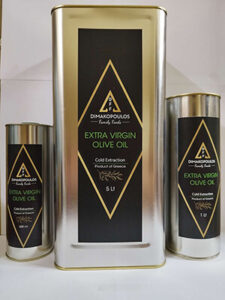Why extra virgin olive oil is the world’s healthiest oil
Olive oil is undoubtedly one of the healthiest fats in the world. It is a key pillar of the Mediterranean diet and is found in many dishes and recipes in Greek cuisine. Folks who have olive oil regularly in their diets are among the healthiest as a rule. All the above are not just rumours and traditions. There are now several scientific studies that support the above claims. Olive oil contains a specific form of fatty acids and antioxidants with powerful properties and health benefits such as protection against cardiovascular disease.

What is olive oil and how is it made?
Olive oil is the juice from … olives. Traditionally we pick the olives, press them and collect the juices from which olive oil is made. However, things are not so simple. There are so many different qualities. Poor quality oils are extracted from the olive juice with chemicals, while others are blended with cheaper oils. So we need to know that NOT all olive oils are the same. There are huge differences. By far the best olive oil is extra virgin. It is extracted using traditional methods and is characterized by purity and qualities such as taste and aromas. True extra virgin olive oil has a distinctive taste that stands out and has a high content of a group of antioxidants that go by the name of phenols. Phenols are responsible for most of the beneficial benefits of olive oil.
In Greece we are particularly lucky as we have a huge production of olives and oil of relatively good quality and at low prices. Abroad, one of the biggest food scandals is the adulteration of olive oil, which is sold at high prices.
The nutritional value of 100 grams of olive oil is as follows
- Calories: 884 calories
- Proteins: 0
- Carbohydrates: 0
- Vegetable fibre: 0
- Carbohydrates: 0
- Fats: 100
- Sodium: 2mg
- Potassium: 1mg
- Calcium: 1mg
- Iron: 0.6mg
- Lipid and vitamin analysis:
- Saturated fat: 14gr
- Monounsaturated fats: 73gr (most of which are 18-carbon oleic acids).
- Omega-6: 9.7gr
- Omega-3: 0.7gr
- Cholesterol: 0
- Vitamin E: 72% of HRV
- Vitamin K: 75% of EFI
Benefits of extra virgin olive oil
The health benefits of olive oil are unrivalled and research reveals more benefits almost every day. Olive oil is the cornerstone of the Mediterranean diet – a mainstay of nutrition for the world’s oldest civilizations. Olive oil is made from the fruit of the olive tree, which is naturally rich in healthy fatty acids. There are several types of olive oil on the market today, including extra virgin olive oil, virgin olive oil and regular olive oil – but research shows that the benefits of extra virgin olive oil are more abundant than other varieties.
So let’s take a look at the health benefits of extra virgin olive oil
Works as an anti-inflammatory
Oleocanthal is a specific phenolic compound found in extra virgin olive oil and is said to be responsible for the burning or tingling sensation that occurs when tasting a high quality extra virgin olive oil. The phenols present in olive oil have anti-inflammatory properties and therefore may have similar effects to painkillers and antipyretics. It can also help prevent Alzheimer’s disease and kill cancer cells. Oleocanthal clears beta-amyloid plaques from the brain.
Enhances hair and skin health
Extra virgin olive oil is rich in vitamin E. Each tablespoon of extra virgin olive oil has about 1.9 mg of vitamin E, a fat-soluble antioxidant that can protect the body from eye and skin problems and actually makes very hair and skin healthier. It has also been shown to protect the body from diabetes, neurological diseases like Alzheimer’s and lung cancer.
Protects against diabetes
A diet rich in olive oil, low in saturated fat, moderately high in carbohydrates and soluble fibre from fruits, vegetables, legumes and grains has been shown to be the most effective approach for diabetics. It helps reduce “bad” low-density lipoproteins while improving blood sugar control and enhancing insulin sensitivity.
Protects against insulin resistance
Extra virgin olive oil contains vitamin K, which is another fat-soluble vitamin that has the greatest effect on the blood. It is essential for healthy clotting and calcium levels in the blood. One tablespoon of olive oil a day will fill 10% of the daily recommended intake of vitamin K and may help protect against insulin resistance and various types of cancer.
Reduces heart problems & diabetes
Natural olive oil contains 70% monounsaturated fatty acids. As a result, it reduces cholesterol buildup in the blood and reduces heart problems. Olive oil also reduces the risk of diabetes and atherosclerosis.
Reduces high blood pressure
Recent studies show that regular consumption of olive oil can help reduce both systolic and diastolic blood pressure.
Improves blood cholesterol levels
Olive oil lowers the levels of total blood cholesterol, LDL-cholesterol and triglycerides. LDL cholesterol is the bad type of cholesterol, which increases the risk of heart attacks and lung heart disease. Extra virgin olive oil, which is rich in nearly 40 antioxidant chemicals, helps reduce the oxidizing effects of LDL cholesterol.
Helps in weight loss
Although high in calories, olive oil has been shown to help reduce obesity levels. Medical experts suggest that it is very difficult to gain weight from the monounsaturated fats present in olive oil. Experiments with Mediterranean olive oil have shown positive results in terms of reducing human body weight.
Boosts metabolism
Olive oil boosts metabolism, the development of good bone structure and brain development in children. It is an excellent source of vitamin E, which is very beneficial for the elderly.
Improves digestion
Olive oil is known to help in the process of digestion. It is used as a medicinal oil to cleanse the digestive tract and improve bowel movements.
Helps in the aging process
Rich in antioxidants, olive oil slows down the natural aging process of the human body. Used in cosmetic products and natural herbal treatment, it works wonders on the skin, which gets a natural glow and radiance from the enriching oil.
Protects against osteoporosis
High consumption of olive oil seems to improve bone mineralization and calcification. It helps in the absorption of calcium and therefore plays an important role in helping sufferers and preventing the onset of osteoporosis.
Prevents gallstones in the gallbladder
Recent studies have shown that moderate consumption of olive oil (about 2 tablespoons per day) can actually reduce your chances of developing gallstones. One ingredient in olive oil apparently helps lower cholesterol levels in the blood and gallbladder. Large amounts of olive oil and lemon juice, as well as Epsom salts, are common ingredients in gallbladder sublimations that are supposed to be intended to remove gallstones.
Strengthens healthy cell walls
Olive oil contains polyphenol which helps strengthen cell walls. It also increases the elasticity of arterial walls, protecting against various heart diseases.
Protects against hypertension
A recent research study shows that a Mediterranean diet that includes foods rich in unsaturated fats (found in olive oil and nuts) and nitrites and nitrates (found in green leafy vegetables) can protect you from hypertension.
Fights mood disorders and depression
Healthy fats, including olive oil, have balancing hormonal, anti-inflammatory effects that can prevent neurotransmitter dysfunction. Low-fat diets are often associated with higher rates of depression and anxiety. Mood or cognitive disorders can occur when the brain does not receive enough “happy hormones” such as serotonin or dopamine, important chemical messengers necessary for mood regulation, good sleep and thought processing.





Reviews
There are no reviews yet.